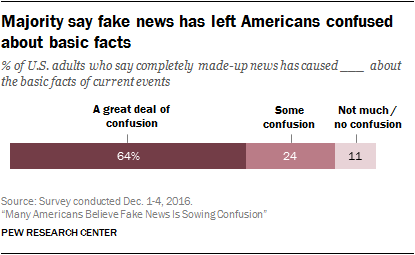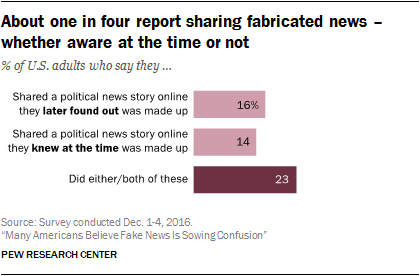rs344103@ohio.edu
Survey results from the Reuters Institute for the Study of Journalism show that as of February 2018, only 34% of Americans trust in news media.
 |
| Full graph available at Statista. |
Bill Kovach and Tom Rosenstiel, in their Elements of Journalism, point out that journalism is “an act of character”. The now infamous ex-journalist Jayson Blair is their antithesis poster boy to this axiom. Blair managed to climb into a prominent position as a journalist at the New York Times by fabricating details and plagiarizing other news sources – all thanks to poor internal communication. The fallout was significant, and quite scandalous. You can read an in-depth look at the ethical implications of this incident over at the Society of Professional Journalists. When events like this unfold at high-profile news sources such as the New York Times, how is the general public to know what news they can trust? It is only natural that such revelations damage the credibility of not just the New York Times, but other news sources as well.
 |
| JAYSON BLAIR'S FINAL NEW YORK TIMES PRESS RUN New York Observer May 14, 2003 |

This concern about confusion over facts is not unfounded. With the rapid spread of information over social media, false information can move dangerously fast. In fact, the Pew Research Center shares that approximately one in four Americans report sharing fabricated news online.

The concern over fake news crosses party lines, but it is something that the current presidential administration, warranted or not, pushes and keeps at the forefront of the public’s mind.
According to an article by CNN, Trump used the term “Fake” 404 times between January 20, 2017 and January 18, 2018. The point here is not whether his decries were valid. The point is that keeping such a loud diatribe churning in the public sphere can impact the level of distrust in news media, increasing confusion over what is trustworthy.
 |
| Credit: MANDEL NGAN/AFP/Getty Images |
These are just a few examples of why an increasing distrust in our news media may be surfacing. Is there a remedy to these trust issues? How can journalists work to regain the waning trust of their patrons? That is a difficult answer to find...
NPR Public Editor Elizabeth Jensen, in an opinion piece for NPR, shares just a few bulleted points that may help in the effort to restore this trust. Among them, she shares:
- having an ethics code,
- a clear corrections policy,
- transparency as to who funds you,
- transparency as to who leads the organization,
- a policy of disclosing any issues on which you express an advocacy voice and why you do so,
- disclosure of your fact-checking process
Jensen's advice suggests that journalists should work on improving their reputation through their actions.
For example, acting ethically will come through in the end product and improve/maintain good public opinion. In their book Elements of Journalism, Kovach and Rosenstiel expound on the importance of the journalist exercising their conscience in the newsroom, and that it is important for their conscience to be heard and discussed openly. An organizational ethics code, as Jensen suggests, is a valuable tool to fall back on when decisions are tough.
Corrections policies show the public that the journalists are working to ensure their information is accurate, even after the fact. Jensen's suggestion of having a clear corrections policy is on point.
Transparency with news organization sponsors, leaders, and how the organization gathers and verifies facts all show the news consumer that careful consideration is put into the delivery of their information.
There is certainly more items that could be added to this list, but it is a great foundation to work from. Winning back public trust in the news media will be a tough battle. Through careful execution of deeds and maintaining a proper code of ethics, journalists might be able to rebuild this trust and rise above the sources of disinformation that led a majority to distrust the news media as a whole.
No comments:
Post a Comment